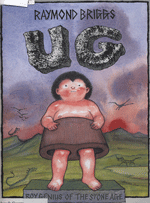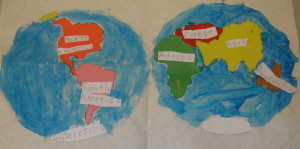 The offspring brought this book, Ug: Boy Genius of the Stone Age by Raymond Briggs, home from the library last night. Without even opening it, I agreed to read it for bedtime stories. Opening the book, I discovered that rather than being a straightforward picture book, it’s laid out in comic book/graphic novel style, with lots of panels (and lots of words) per page. Had I taken a peek and seen how many words we were committing to, I might have postponed our first reading until a middle-of-the-day kind of moment. However, we got through the book, and the elder offspring was held rapt for the duration. And so, I offer this review.
The offspring brought this book, Ug: Boy Genius of the Stone Age by Raymond Briggs, home from the library last night. Without even opening it, I agreed to read it for bedtime stories. Opening the book, I discovered that rather than being a straightforward picture book, it’s laid out in comic book/graphic novel style, with lots of panels (and lots of words) per page. Had I taken a peek and seen how many words we were committing to, I might have postponed our first reading until a middle-of-the-day kind of moment. However, we got through the book, and the elder offspring was held rapt for the duration. And so, I offer this review.
Category Archives: Kids and science
Show me the continents if you can …
A visual addendum to last Friday’s bonus entry:

Friday Sprog Blogging (bonus edition): you are here
Because today is the first blogiversary of “Adventures in Ethics and Science”, you get a bonus sprog-blog. And possibly cake, if I can find some.
Younger offspring: In nature study at school, we’re not studying the planets any more. Now we’re talking about Earth.
Dr. Free-Ride: Oh? What are you learning about Earth?
Younger offspring: We’re learning about the continents. Yesterday I finished pricking out* all the continents.
Dr. Free-Ride: So I bet you can tell me the names of them.
Younger offspring: (singing) Tell me the continents, tell me the continents, tell me the continents if you can! North America, South America, Europe, Asia, and Africa! Don’t forget Australia! Don’t forget Antarctica! (Stops singing) Actually, there are two Antarcticas.
Dr. Free-Ride: Two Antarcticas?!
Younger offspring: On the maps. There’s part on the map with Africa and Australia and Asia, and part on the map with North America and South America an’ a little bit of Asia.
Dr. Free-Ride: Oh, so there’s only one Antarctica, but it’s in both pictures of the continents.
Younger offspring: On the globe, there’s only one Antarctica.
Dr. Free-Ride: Yes, the maps are giving a flattened picture of continents that are actually on a sphere. It’s hard to get the surface of a sphere onto a rectangle properly.
Younger offspring: A spear?
Dr. Free-Ride: A sphere. You know what a sphere is.
Younger offspring: Round, like a soccer ball. We live in the Northern Hemisphere. Antarctica is in the Southern Hemisphere. (Starts singing again) Tell me the continents, tell me the continents, tell me the continents if you can!
Dr. Free-Ride: You guys have a song for everything.
Younger offspring: Daddy’s iPod has a song about the continents, too. [Tangerine Dream, “Kiev Mission”] (Reciting in the same European accent heard in the recording) Asia, Africa, Europe, Australia, America … (Back to normal voice) But that song doesn’t have Antarctica at all.
—-
*Pricking out shapes (of letters, numbers, animals, continents, etc.) is apparently a Montessori thing.
Friday Sprog Blogging: what it would be like to be a bat
Elder offspring: Nocturnal animals are much cooler than diurnal ones.
Dr. Free-Ride: Why do you think nocturnal animals are cooler?
Elder offspring: (with a look of exasperation) Because they get to stay up at night!
Dr. Free-Ride: (to self) And sleep during the day …
Elder offspring: And, bats — which are my very favorite nocturnal animal — use echolocation so they don’t fly into things. They make these sounds (makes a high-pitched screechy sound) an’ the sounds bounce off of objects, an’ the bats listen to the sounds coming back to them, and then they know where the objects are so they won’t run into them.
Dr. Free-Ride: That must be really handy in the dark.
Elder offspring: Or even not in the dark, if your eyesight isn’t very good. It would be fun to be a bat.
Dr. Free-Ride: Do you think bat children are better listeners than human children?
Elder offspring: Maybe not at first. But after bumping into a bunch of things, they’d learn to listen pretty quick. Some bats eat fruit. Other bats eat bugs, or even blood. I would be a fruitbat.
Dr. Free-Ride: That sounds like fun.
Elder offspring: There’s one more thing that I wish I didn’t have to tell you, but it’s true: Sometimes bats get eaten by owls.
Dr. Free-Ride: Hmm. That part doesn’t sound like fun.
Younger offspring: (digging through a box of old drawings) My favorite nocturnal animals are raccoons. What’s yours?
Dr. Free-Ride: Uhh … chinchillas? Are chinchillas actually nocturnal?*
Younger offspring: The song says they are.**
___
*Other sources concur that chinchillas are nocturnal.
**The use of chinchillas described in the song would never get IRB approval, so don’t try it at home!
UPDATE: For those (like my mom) skittish about downloading appropriate plug-ins to experience the song, here are the lyrics.
Friday Sprog Blogging: methodological concerns
Yesterday was Groundhog’s Day and Punxsutawney Phil saw his shadow. The elder Free-Ride offspring expressed concerns about the conclusion that we’re in for six more weeks of winter:
- This is backwards! Seeing his shadow means it’s sunny. Sunny means it’s more like spring. I think seeing his shadow means spring should come sooner, not later.
- That groundhog is in Pennsylvania. We’re in California! Maybe we get spring sooner even if Pennsylvania gets six more weeks of winter. We would really need a groundhog in California to find out anything about what’s going to happen with spring in California.
- Why do they only check what the groundhog sees on this one day? Wouldn’t it be better to check whether the groundhog sees his shadow for lots of days? That would give more information about whether spring is coming sooner or later.
After enumerating all these problems with the Groundhog’s Day methodology:
“I don’t think groundhogs really know how to predict the weather. And, people who think whether the groundhog sees his shadow will tell them when spring will come are being kind of silly.”
Of course, Pseudonymous Kid suggests a change to a different animal system for the prediction.
UPDATE: Caroline Helpy-Chalk proposes yet another animal system here. I see the beginnings of a high-powered research institute …
Friday Sprog Blogging: why we love science!
Elder offspring (age 6.5): I can’t wait for Friday! We get to do science in school!
Younger offspring (age 4.5): We do nature study every day.
Dr. Free-Ride: That’s because you don’t have standardized tests yet, or the science would get crowded out by all the other stuff on the test.
Elder offspring: We’re learning about the life-cycles of different animals. And, we have two bearded dragons in our science classroom.
Younger offspring: We’re learning about marine mammals, but Aidan C. and I call them “gaREEN mammals”.
Dr. Free-Ride: Green mammals? You two are silly, aren’t you. Hmm … are there any green mammals?
Dr. Free-Ride’s better half: Sloths.
Dr. Free-Ride: Sloths?
Dr. Free-Ride’s better half: Sloths. An algae grows on them* and helps them blend in with leaves.
Dr. Free-Ride: Cool! Like what happened to the polar bears at the zoo when there was algae growing in their hair shafts.
Younger offspring: What other color mammals are there?
Dr. Free-Ride: When you guys were babies I fed you lots of carrots to see if I could make you orange mammals.
Elder offspring: Did it work?
Dr. Free-Ride: It did not. Is there no mammal that I can turn orange by feeding it lots of carrots?
Younger offspring: Not one that you can turn orange.
Friday Sprog Blogging: scientific controversy at the breakfast table
(Based on actual events.)
Younger offspring (age 4.5): (singing softly to self while arranging a line of nine grapes on breakfast plate) Nine planets, fine planets, in our solar system. Nine planets, fine planets, go ahead and list ’em … *
Elder offspring (age 6.5): You know, in school we learned that they discovered a tenth planet. They used to call it planet X, but now they’re callin’ it Xena.
Younger offspring: (glowering at sibling and singing louder) NINE planets! FINE planets! In our sol-ar SYStem! NINE planets! FINE planets! Go ahead and LISTthem!
Dr. Free-Ride’s better half: (from the next room) Didn’t they decide Pluto is too small to be a real planet?
Dr. Free-Ride: Pluto is too a planet! It was a planet when I learned it in school, and it hasn’t gotten any smaller since then!
Younger offspring: Pluto is a planet. It’s in the song.
Elder offspring: Xena’s a planet, too.
Younger offspring: (glower set at full strength) Xena isn’t in the song.
Dr. Free-Ride: I think that song was written before they discovered Xena. (To the next room) And Pluto is definitely a planet!
Dr. Free-Ride’s better half: Your education is becoming obsolete. Remember the brontosaurus?
Dr. Free-Ride: Shut up! (To younger offspring) Eat your planets.
*The lyrics to the song were very similar — but not identical — to those of Nine Fine Planets by John Paul Taylor, Jr. If any of my readers is familiar with this variant — and can hook me up with the full lyrics — I’d be much obliged!
